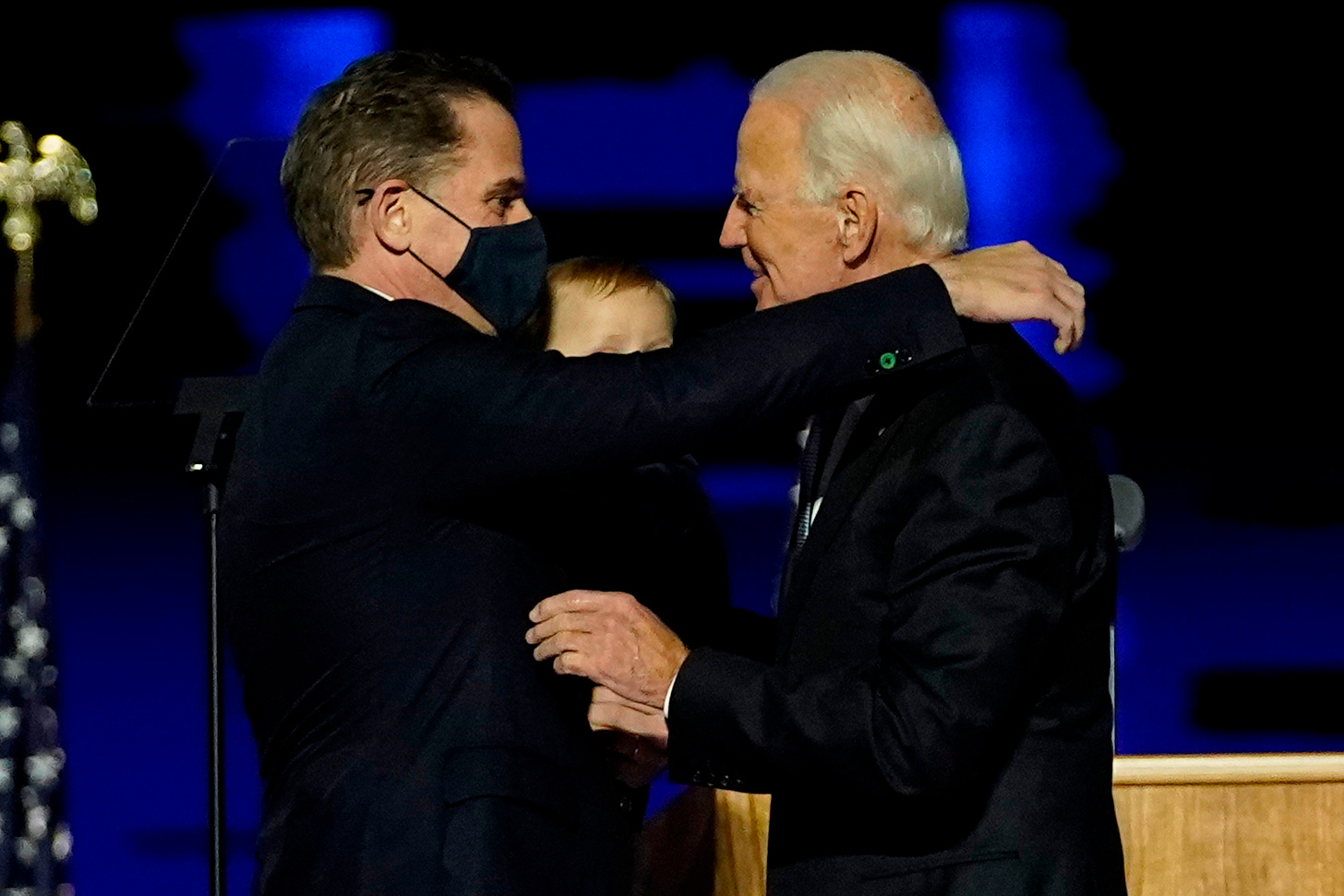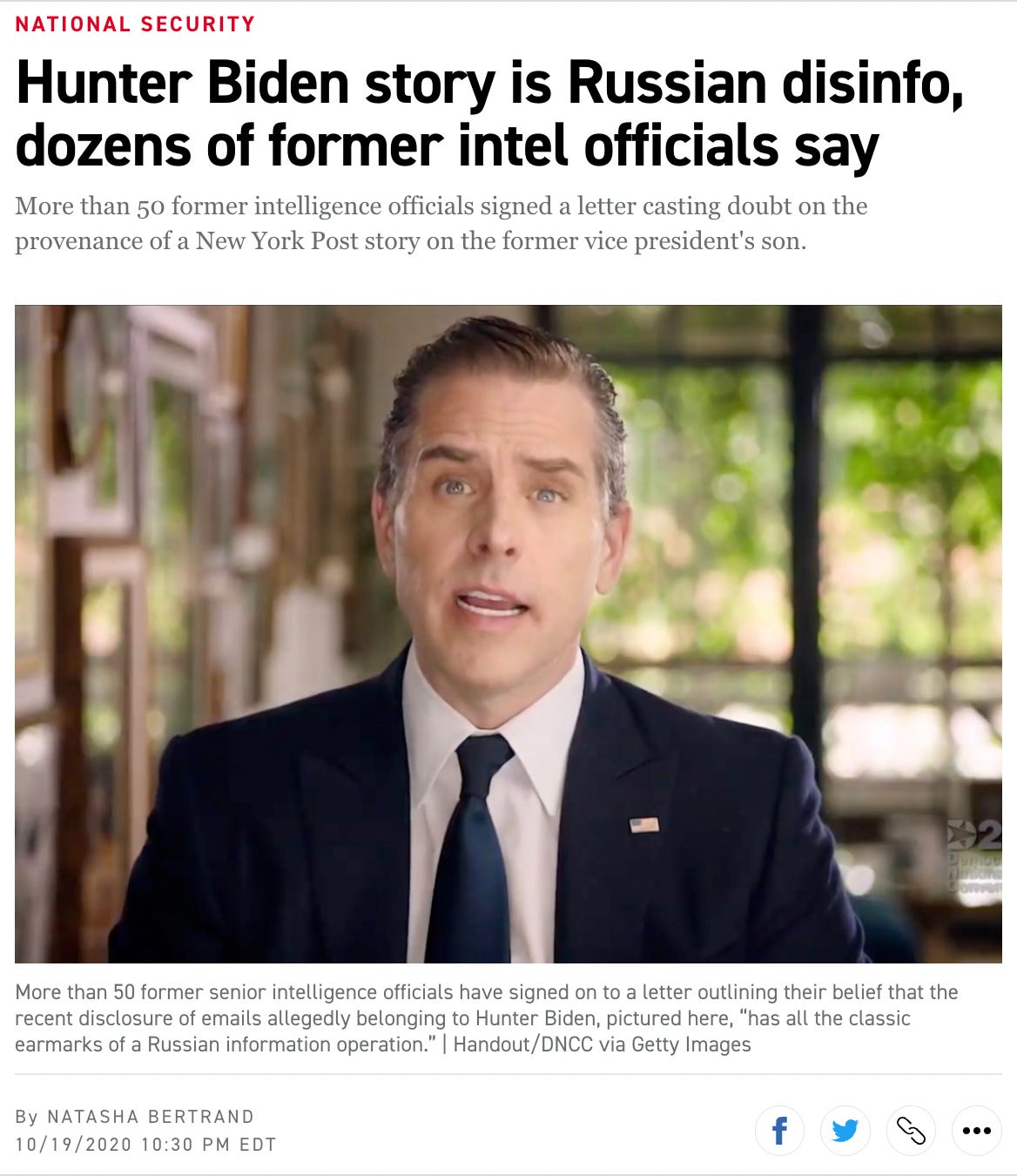The NYT Now Admits the Biden Laptop -- Falsely Called "Russian Disinformation" -- is Authentic
The NYT Now Admits the Biden Laptop -- Falsely Called "Russian Disinformation" -- is Authentic
The media outlets which spread this lie from ex-CIA officials never retracted their pre-election falsehoods, ones used by Big Tech to censor reporting on the front-runner.

One of the most successful disinformation campaigns in modern American electoral history occurred in the weeks prior to the 2020 presidential election. On October 14, 2020 — less than three weeks before Americans were set to vote — the nation's oldest newspaper, The New York Post, began publishing a series of reports about the business dealings of the Democratic frontrunner Joe Biden and his son, Hunter, in countries in which Biden, as Vice President, wielded considerable influence (including Ukraine and China) and would again if elected president.
The backlash against this reporting was immediate and intense, leading to suppression of the story by U.S. corporate media outlets and censorship of the story by leading Silicon Valley monopolies. The disinformation campaign against this reporting was led by the CIA's all-but-official spokesperson Natasha Bertrand (then of Politico, now with CNN), whose article on October 19 appeared under this headline: “Hunter Biden story is Russian disinfo, dozens of former intel officials say.”
These "former intel officials" did not actually say that the “Hunter Biden story is Russian disinfo." Indeed, they stressed in their letter the opposite: namely, that they had no evidence to suggest the emails were falsified or that Russia had anything to do them, but, instead, they had merely intuited this "suspicion" based on their experience:
We want to emphasize that we do not know if the emails, provided to the New York Post by President Trump’s personal attorney Rudy Giuliani, are genuine or not and that we do not have evidence of Russian involvement -- just that our experience makes us deeply suspicious that the Russian government played a significant role in this case.
But a media that was overwhelmingly desperate to ensure Trump's defeat had no time for facts or annoying details such as what these former officials actually said or whether it was in fact true. They had an election to manipulate. As a result, that these emails were "Russian disinformation” — meaning that they were fake and that Russia manufactured them — became an article of faith among the U.S.'s justifiably despised class of media employees.
Very few even included the crucial caveat that the intelligence officials themselves stressed: namely, that they had no evidence at all to corroborate this claim. Instead, as I noted last September, “virtually every media outlet — CNN, NBC News, PBS, Huffington Post, The Intercept, and too many others to count — began completely ignoring the substance of the reporting and instead spread the lie over and over that these documents were the by-product of Russian disinformation.” The Huffington Post even published a must-be-seen-to-be-believed campaign ad for Joe Biden, masquerading as “reporting,” that spread this lie that the emails were "Russian disinformation.”
This disinformation campaign about the Biden emails was then used by Big Tech to justify brute censorship of any reporting on or discussion of this story: easily the most severe case of pre-election censorship in modern American political history. Twitter locked The New York Post's Twitter account for close to two weeks due to its refusal to obey Twitter's orders to delete any reference to its reporting. The social media site also blocked any and all references to the reporting by all users; Twitter users were barred even from linking to the story in private chats with one another. Facebook, through its spokesman, the life-long DNC operative Andy Stone, announced that they would algorithmically suppress discussion of the reporting to ensure it did not spread, pending a “fact check[] by Facebook's third-party fact checking partners” which, needless to say, never came — precisely because the archive was indisputably authentic.
The archive's authenticity, as I documented in a video report from September, was clear from the start. Indeed, as I described in that report, I staked my career on its authenticity when I demanded that The Intercept publish my analysis of these revelations, and then resigned when its vehemently anti-Trump editors censored any discussion of those emails precisely because it was indisputable that the archive was authentic (The Intercept's former New York Times reporter James Risen was given the green light by these same editors to spread and endorse the CIA's lie, as he insisted that laptop should be ignored because “a group of former intelligence officials issued a letter saying that the Giuliani laptop story has the classic trademarks of Russian disinformation.") I knew the archive was real because all the relevant journalistic metrics that one evaluates to verify large archives of this type — including the Snowden archive and the Brazil archive which I used to report a series of investigative exposés — left no doubt that it was genuine (that includes documented verification from third parties who were included in the email chains and who showed that the emails they had in their possession matched the ones in the archive word-for-word).
Any residual doubts that the Biden archive was genuine — and there should have been none — were shattered when a reporter from Politico, Ben Schreckinger, published a book last September, entitled "The Bidens: Inside the First Family’s Fifty-Year Rise to Power," in which his new reporting proved that the key emails on which The New York Post relied were entirely authentic. Among other things, Schreckinger interviewed several people included in the email chains who provided confirmation that the emails in their possession matched the ones in the Post's archive word for word. He also obtained documents from the Swedish government that were identical to key documents in the archive. His own outlet, Politico, was one of the few to even acknowledge his book. While ignoring the fact that they were the first to spread the lie that the emails were "Russian disinformation,” Politico editors — under the headline “Double Trouble for Biden”— admitted that the book “finds evidence that some of the purported Hunter Biden laptop material is genuine, including two emails at the center of last October’s controversy.”
The vital revelations in Schreckinger's book were almost completely ignored by the very same corporate media outlets that published the CIA's now-debunked lies. They just pretended it never happened. Grappling with it would have forced them to acknowledge a fact quite devastating to whatever remaining credibility they have: namely, that they all ratified and spread a coordinated disinformation campaign in order to elect Joe Biden and defeat Donald Trump. With strength in numbers, and knowing that they speak only to and for liberals who are happy if they lie to help Democrats, they all joined hands in an implicit vow of silence and simply ignored the new proof in Schreckinger's book that, in the days leading up to the 2020 election, they all endorsed a disinformation campaign.
It will now be much harder to avoid confronting the reality of what they did, though it is highly likely that they will continue to do so. This morning, The New York Times published an article about the broad, ongoing FBI criminal investigation into Hunter Biden's international business and tax activities. Prior to the election, the Times, to their credit, was one of the few to apply skepticism to the CIA's pre-election lie, noting on October 22 that “no concrete evidence has emerged that the laptop contains Russian disinformation.” Because the activities of Hunter Biden now under FBI investigation directly pertain to the emails first revealed by The Post, the reporters needed to rely upon the laptop's archive to amplify and inform their reporting. That, in turn, required The New York Times to verify the authenticity of this laptop and its origins — exactly what, according to their reporters, they successfully did:
People familiar with the investigation said prosecutors had examined emails between Mr. Biden, Mr. Archer and others about Burisma and other foreign business activity. Those emails were obtained by The New York Times from a cache of files that appears to have come from a laptop abandoned by Mr. Biden in a Delaware repair shop. The email and others in the cache were authenticated by people familiar with them and with the investigation.
That this cache of emails was authentic was clear from the start. Any doubts were obliterated by publication of Schreckinger's book six months ago. Now the Paper of Record itself explicitly states not only that the emails “were authenticated” but also that the original story from The Post about how they obtained these materials — they “come from a laptop abandoned by Mr. Biden in a Delaware repair shop” — “appears” to be true.
What this means is that, in the crucial days leading up to the 2020 presidential election, most of the corporate media spread an absolute lie about The New York Post's reporting in order to mislead and manipulate the American electorate. It means that Big Tech monopolies, along with Twitter, censored this story based on a lie from “the intelligence community.” It means that Facebook's promise from its DNC operative that it would suppress discussion of the reporting in order to conduct a "fact-check” of these documents was a fraud because if an honest one had been conducted, it would have proven that Facebook’s censorship decree was based on a lie. It means that millions of Americans were denied the ability to hear about reporting on the candidate leading all polls to become the next president, and instead were subjected to a barrage of lies about the provenance (Russia did it) and authenticity (disinformation!) of these documents.
The objections to noting all of this today are drearily predictable. Reporting on Hunter Biden is irrelevant since he was not himself a candidate (what made the reporting relevant was what it revealed about the involvement of Joe Biden in these deals). Given the war in Ukraine, now is not the time to discuss all of this (despite the fact that they are usually ignored, there are always horrific wars being waged even if the victims are not as sympathetic as European Ukrainians and the perpetrators are the film's Good Guys and not the Bad Guys). The real reason most liberals and their media allies do not want to hear about any of this is because they believe that the means they used (deliberately lying to the public with CIA disinformation) are justified by their noble ends (defeating Trump).
Whatever else is true, both the CIA/media disinformation campaign in the weeks before the 2020 election and the resulting regime of brute censorship imposed by Big Tech are of historic significance. Democrats and their new allies in the establishment wing of the Republican Party may be more excited by war in Ukraine than the subversion of their own election by the unholy trinity of the intelligence community, the corporate press, and Big Tech. But today's admission by The New York Times that this archive and the emails in it were real all along proves that a gigantic fraud was perpetrated by the country's most powerful institutions. What matters far more than the interest level of various partisan factions is the core truths about U.S. democracy revealed by this tawdry spectacle.

Comments
Post a Comment